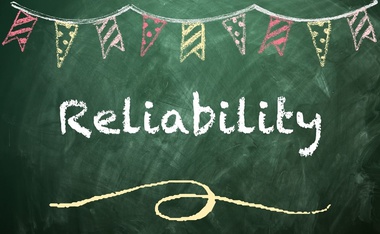The views expressed in our content reflect individual perspectives and do not represent the authoritative views of the Baha'i Faith.
Among all the people you know, which one of them can you truly depend on? When you think about that person, what spiritual quality comes to mind? Chances are it is reliability.
Reliability means being trustworthy and dependable. When we are reliable, we follow through with tasks we agreed to do without forgetting or having to be reminded.
RELATED: The Virtues Basket: Strengthening Our Self-Discipline
When we’re reliable, others can count on us. We do what we have promised with care, and others can have peace of mind knowing things are in our reliable hands. A reliable person finishes his or her tasks on time, but if any obstacle interrupts their plan to finish on time, they find another way to get it done.
The Baha’i teachings praise reliability, and encourage everyone to develop and practice it as a spiritual virtue. Shoghi Effendi, the Guardian of the Baha’i Faith, wrote in his Advent of Divine Justice that a Baha’i life requires “an abiding sense of undeviating justice” which includes honesty and reliability:
This rectitude of conduct, with its implications of justice, equity, truthfulness, honesty, fair-mindedness, reliability, and trustworthiness, must distinguish every phase of the life of the Baha’i community.
We can all be reliable by taking our tasks – and our commitments – seriously. Here are a few helpful strategies to make that happen.
Task Batching
In order to be reliable, we need to plan ahead. Matthew Canning, a leadership and productivity educator, suggests that “task batching” – performing related tasks together to minimize time, resources, and risks required to perform them – helps us be more efficient and reliable.
When we shower, for example, we don’t wash our hair, come out of the shower and dry off, then go back in to wash our face and body separately. Instead, we batch our tasks. However, not all task batching points are that obvious. By asking an action question like “Can these tasks be arranged to help me save time and have a more productive and peaceful day?”, we can create a daily do-to list for ourselves, grouping some tasks together to be more efficient and reliable.
Task Front-Loading
Another way to become more reliable and trustworthy is to keep our commitments – to get our responsibilities done, even if they are difficult. Canning says “task front-loading” – getting the unpleasant tasks done first without delay, complaint, or procrastination – is another strategy that can help us be reliable. Task front-loading can easily become a habit, decreasing anticipatory dread, creating a positive perception of our character, and reducing the risks of not finishing our important responsibilities on time. Task front-loading helps us be mature and trustworthy.
Pre-Planning and Full Engagement
The last strategy that can help us achieve reliability, Canning explains, is to be fully engaged in what we do, staying on-task and in the present. Pre-planning our day alleviates the anxiety of falling behind. Then we need to dedicate our attention to the individual tasks at hand, and resist the urge to think about other duties or the immediate future. We just need to be in the moment, relax, and commit to doing a good job. This simple strategy improves the overall quality of our lives and increases the efficiency of our work.
To achieve our goals, we should expend enough effort, be consistent, and persevere. When we develop the habit of finishing our tasks, and recognize that the quality of what we do is also important, it will improve our lives. This holds true for our personal and spiritual development, and when we are engaged in acts of service to humanity. To spread the message of unity and oneness through service, we must generously offer our time and energy to bring peace and unity among all humankind.
When we walk this path of selfless service, we must strive to achieve our own intellectual and spiritual growth, and contribute to the transformation of society. Baha’u’llah, the founder of the Baha’i Faith, wrote:
The incomparable Creator hath created all men from one same substance, and hath exalted their reality above the rest of His creatures. Success or failure, gain or loss, must, therefore, depend upon man’s own exertions. The more he striveth, the greater will be his progress.
How Can Children Learn Reliability?
We can help our children practice reliability from a young age by helping them create a to-do list whiteboard and check mark each task when done. This gives them a sense of accomplishment, reward, and completion, and trains their minds and hearts to contribute to the family and to society. Those to-do lists can include, for example:
- brushing teeth
- washing the dishes
- making the bed
- cooking a meal
- cleaning up after playtime
- reading a book
- and saying prayers daily.
Many children today no longer have the opportunities to altruistically serve others that children once had in more agrarian societies – to be integral and necessary parts of a working family unit, and therefore to understand their reliable contributions as necessary to the well-being of everyone. When we invite our children to take part in these kinds of chores and activities, it increases their self-worth and their capacity for becoming service-minded adults who reliably contribute to the larger community and consider themselves full, participating members of the human family.
This Virtues Basket video helps provide an understanding about what it means to be reliable and how to practice it.
















Comments
Sign in or create an account
Continue with Googleor